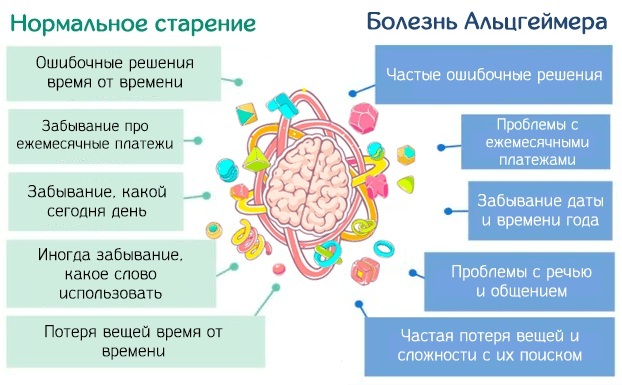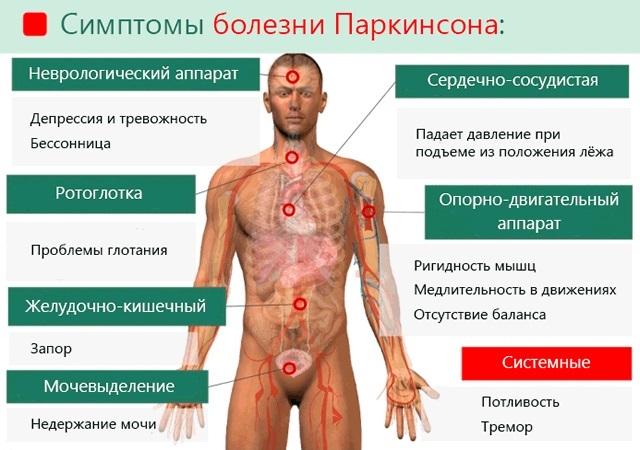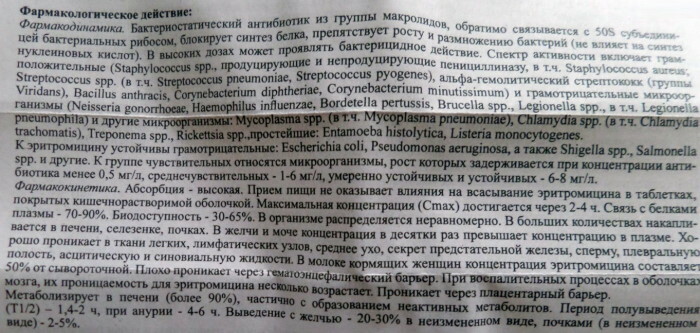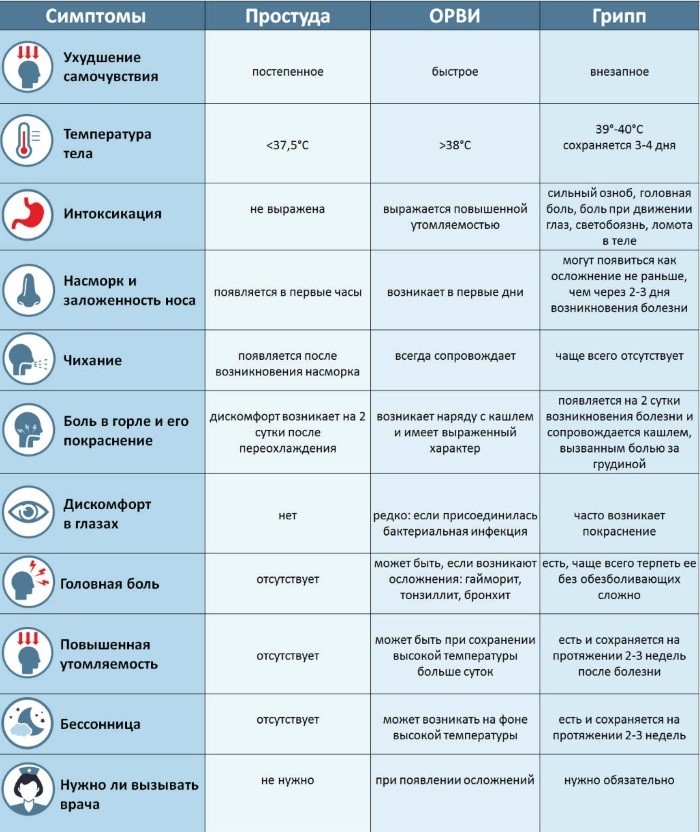Content
- Causes of dementia in middle-aged and older women
- Stages of the disease in women
- Early signs of dementia
- Late symptoms
- Signs of different types of disease in women
- What to do if symptoms of dementia appear?
- Treatment
- Forecast
- How to create a safe living environment?
- Dementia Videos
Dementia is more commonly diagnosed in women old age. In other words, a pathological condition is called senile dementia, when a person does not understand what is happening around him. The disease is characterized by damage to brain cells. Pathological processes provoke their destruction, against the background of which characteristic symptoms and signs appear. The patient loses his abilities, skills and knowledge. He needs not only medical help, but also family support.
Causes of dementia in middle-aged and older women
Dementia in women is often provoked by pathologies of the nervous system.
But there are other factors triggering the mechanism, diseases:
- Alzheimer's disease;
- Lewy body syndrome;
- high blood pressure;
- benign and malignant processes;
- atherosclerosis;
- stroke;
- bad habits (abuse of alcoholic beverages, tobacco products);
- viral encephalitis;
- multiple sclerosis;
- meningitis;
- AIDS;
- gene mutations;
- wrong lifestyle;
- lupus erythematosus;
- endocrine system damage;
- mechanical damage to the head.

Statistics showing the causes of dementia in the elderly
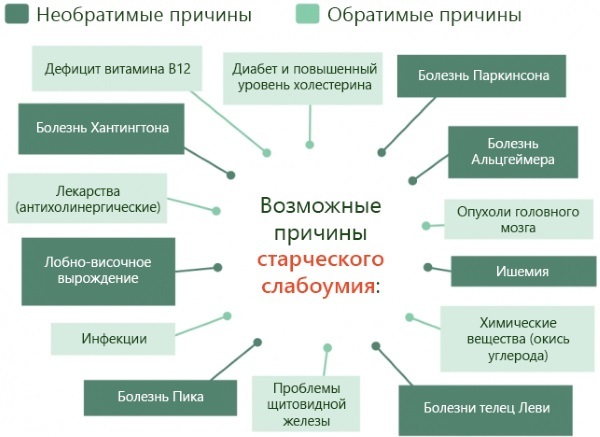
Diabetes mellitus and obesity of varying degrees also provoke the development of dementia in women. The same goes for hereditary predisposition. If the family has relatives with this diagnosis, the likelihood of developing the disease increases.
Stages of the disease in women
Dementia (symptoms and signs in women require a complete medical examination) develops gradually. There are certain stages of the disease as the pathological changes progress.
| Name | Description |
| The first | Pathological processes develop without pronounced symptoms. In rare cases, a person has a violation of intellectual abilities. In the first stage of dementia, patients are fully able to take care of themselves. |
| The second | Already gross changes have been noted with regard to intellectual activity. Deep self-criticism arises. Forgetfulness and difficulties with the use of household items appear. The patient needs the care and supervision of relatives, since they can unconsciously harm themselves and those around them. |
| Stage three dementia | The last stage in the development of the disease, at which there is a complete disintegration of the personality. A person cannot take care of himself on his own, he does not recognize his relatives and friends. Logical thinking is broken, there is no desire to communicate with other people, apathy towards others appears. In stage three dementia, people need to be cared for and cared for throughout the day. |
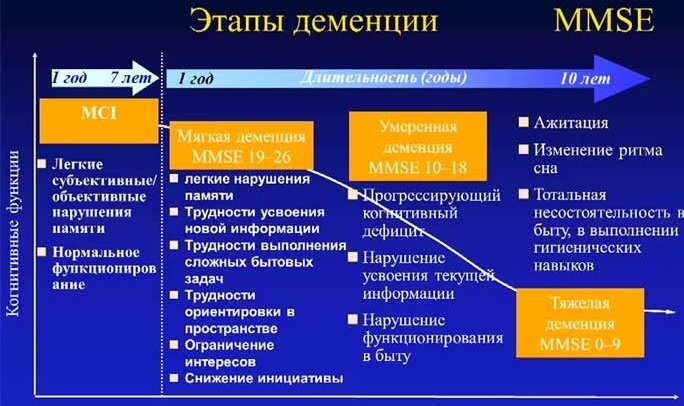
It is important to start treatment at an early stage of the pathology in order to have a better chance of slowing the progression of the disease. Senile dementia in women lasts 6-8 years. The disease ends in death when the patient is already in deep insanity. Timely therapy will only help to delay the onset of the last stage of pathology.
Early signs of dementia
It is possible to determine the beginning of the development of pathological changes by the behavior of a person, how he formulates his ideas, talks and takes part in a conversation with other people. There are certain features that need to be considered in order to suspect the development of dementia.
| Name | Description |
| Difficulty finding the right word | A person has difficulty expressing his thoughts, because he cannot find the right words. In most cases, it's just excitement. It is worth worrying when the patient cannot remember the correct word. This is an early symptom. If it is difficult for a person to draw his thoughts even on paper, the problem is already progressing. An urgent specialist consultation is required. |
| Increased forgetfulness | Short-term memory lapses also require examination and medical advice. If it is not dementia, then inflammation or atrophy of the prefrontal cortex may be the cause. |
| Anxiety, suspiciousness | Early signs of senile dementia, which are acutely manifested in an uncomfortable environment for a person or when he performs unusual actions. The patient is depressed, anxious and suspicious. The person is silent, aggressive and grumpy. |
| Mood changes, depression | |
| Personality changes | |
| Disorders of orientation in time and space | The patient is lost not only in time, but also in space, he can get lost in his hometown. |
| Loss of interest in hobbies | The desire to do things you love earlier disappears. The patient can walk from corner to corner for a long time, sit and look at one point. Complete apathy appears. |
| Aimlessness | A person has no desire to learn something new, since the brain loses the ability to process the information received. |
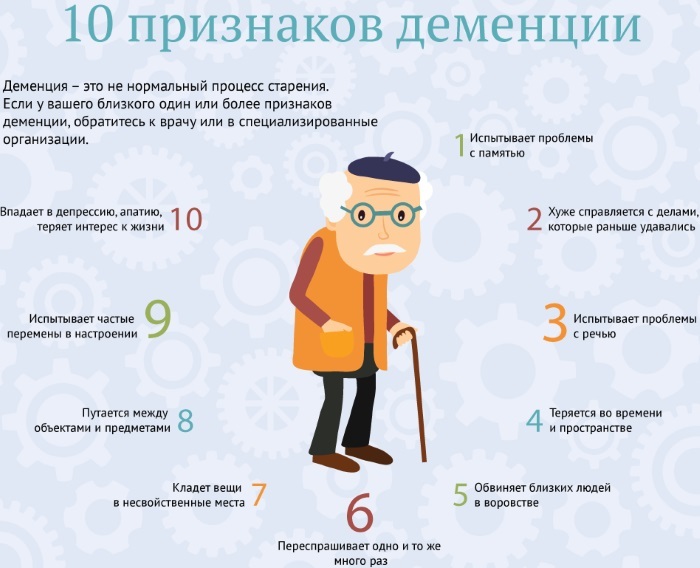 A symptom of dementia in women is also a dramatic change in sleep. A person is awake at night, and sleeps a lot during the day.
A symptom of dementia in women is also a dramatic change in sleep. A person is awake at night, and sleeps a lot during the day.
The same applies to the lack of ability to correctly distinguish bills, numbers, fill out simple documents, memorize the sequence of processes. The patient constantly shifts or hides objects, and then may accuse another person of stealing. It is also a symptom of senile dementia. He is not able to follow the logic of a conversation, it is difficult for him to memorize words.
Late symptoms
In the last stages of the development of dementia, there is a fundamental change in the functioning of the brain.
The accompanying symptoms are the following:
- the patient's thinking and speech are incoherent;
- the patient is not able to perceive, understand, imagine;
- communication skills deteriorate;
- consciousness, thinking, behavior is disturbed;
- self-criticism is completely absent;
- confusion occurs periodically.
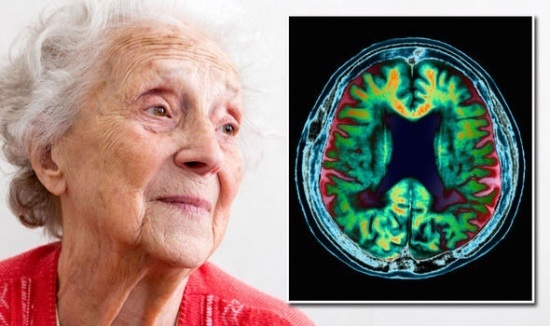
Contact with people around you is completely lost. Patients are incapable of self-care and need careful care.
Signs of different types of disease in women
Depending on the provoking factor and concomitant pathology, the clinical symptoms of senile dementia will differ.
| Name | Description |
| Dementia in Alzheimer's Disease | Progressive illness leads to the fact that real memories are replaced by false events. At the last stages of pathology, they are completely erased from the memory of a person. In this case, accompanying symptoms also appear:
|
| How does vascular dementia manifest? | Vascular pathologies occur as a result of impaired blood circulation in the region of the brain. Most of the patients are diagnosed with discirculatory encephalopathy. A disease characterized by memory impairment. The patient loses the ability to navigate in space. Other clinical symptoms also appear:
|
| Lewy body dementia | Patients have such vivid and realistic dreams that they make sudden, uncontrolled movements. This can harm themselves or a nearby person. There is disorientation in space and time. Cognitive impairments develop, hallucinations and movement abnormalities are present. Problems with concentration appear. Mental activity decreases, metabolic processes are disrupted, cardiovascular diseases develop. |
| Parkinson's disease: association with dementia and characteristic symptoms | In this situation, a woman has not only forgetfulness and a gradual loss of skills. Dementia, which occurs along with Parkinson's syndrome, is accompanied by the following clinical symptoms:
|
| Frontotemporal degeneration | Early signs of the disease are progressive speech disorder. The patient has a cheerful mood for no reason, sexual intemperance increases, and antisocial behavior. Passivity and indifference to the outside world are periodically manifested. Eating habits and behavioral skills change, and intellectual rigidity develops. |
| Huntington's disease | The disease proceeds with movement disorders and cognitive impairments. A specific sign of pathology is a change in behavior. Hot temper and aggression are replaced by apathy towards the outside world. Young patients develop persecution mania, hallucinations. |
| Pick's disease | The patient has a severe personality disorder. As the pathological processes progress, memory is impaired. There is no criticism of your condition at all. Thinking is gradually disturbed, problems with expression of will and attraction appear. Automated skills are retained. Aggression, rudeness, hypersexuality appear. Speech and actions are stereotyped. |
In any situation, dementia in women progresses to the point where the patient is indifferent to the world around her. She cannot use household appliances correctly, which entails a threat to both the person and the people around her.
What to do if symptoms of dementia appear?
Dementia (symptoms and signs in women will help the neurologist to determine the stage of the disease) is treated early without the use of medications. Such therapy will help slow the progression of pathological processes and support the proper functioning of the brain.
The main directions of therapy:
- More movement. At an early stage of the development of the disease, the patient is recommended to ensure the maximum level of physical activity. The attending physician will help you choose a set of simple exercises. It is also necessary to walk more in the fresh air, to do simple work in the garden or in the country.
- Communication. It is necessary to maintain a conversation with patients or ask questions in short sentences so that the person can answer briefly. It is recommended to unsubscribe from new acquaintances. Dementia patients have a hard time remembering new people, which can negatively affect their condition and provoke a deterioration in health.
-
Brain training. People with dementia need to engage in moderate mental activity. Playing chess, reading and writing, and bingo are all suitable here. It is important to choose your favorite hobby, which will not only be fun, but will also help train your brain.
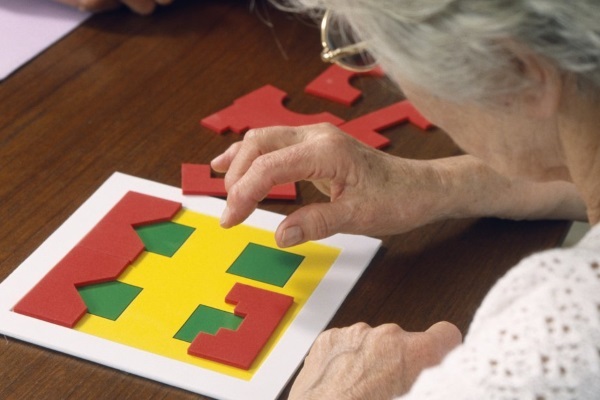
- To give up smoking. It is necessary to completely say goodbye to bad habits. This applies not only to smoking, but also to alcoholic beverages.
- Healthy sleep. It is important to follow the regime. A person with dementia should sleep at least 7 hours a day.
- Correct diet. The diet of a patient with dementia includes a fortified menu and healthy food. The diet must contain fruits and vegetables, vegetable oils, fish and seafood. It is better to cook dishes in water or steam, also bake. Reduce the consumption of table salt to a minimum. Do not forget about the drinking regimen, the minimum amount of water per day is 30 ml per 1 kg of body weight.
- Maintaining the level of vitamins in the body. You can replenish your vitamin reserves if you make the right menu. A dietitian doctor will help you with this. If necessary, the attending physician will select a special vitamin and mineral complex.
If a person has the first symptoms of dementia, he or she must be consulted by a neurologist or psychologist. Early diagnosis and the right treatment will help slow down the progression of the disease. Otherwise, progressive pathological processes will lead to irreversible consequences, against the background of which a person may even die.
Treatment
Dementia in women is diagnosed and treated by a neurologist or psychiatrist. The treatment regimen for each patient is compiled individually after a comprehensive diagnosis. In most cases, medication is given to help restore cognitive function and maintain proper brain function. The main group of patients is treated at home. Hospitalization of a person is necessary if there is a threat to the people around him.
Dementia (symptoms and signs in women differ depending on the stage of the disease and the degree of brain damage) is treated with the following drugs:
| Drug group | Name | Application |
| Acetylcholinesterase inhibitors | Donepezil, Rivastigmine | Medicines slow down the production of a certain hormone that helps break down acetylcholine. The tablets should be taken in the evening, just before bedtime. The adult dosage is 5-10 mg once a day for a month.
|
| Glutamate Receptor Inhibitors | Amantadine, Memantine | The drugs reduce the sensitivity of nerve cells. Medicines are taken by mouth or given intravenously. The recommended dosage for adult patients is 100-200 mg. |
| Antidepressants | Paroxetine, Fluoxetine | Medicines relieve depression and apathy. The drug should be taken once a day in the morning with meals. The daily dosage is 20 mg, it can be divided into 2 doses. The tablets should not be chewed and should be taken with a sufficient amount of water. The minimum course of treatment lasts 6 months. |
| Antipsychotics | Risperidone, Quetiapine | The drugs eliminate hallucinations and delusions, restore human antisocial behavior. The dosage of the drug for each patient is individual and is 0.25-6 mg per day. |
| Antihypertensive medicines | Captopril, Diroton | Medicines lower blood pressure and prevent stroke. The dosage of the drug is selected for patients on an individual basis and is 25-150 mg per day. The indicated amount of medication should be divided into 3 doses. |
| Nootropics | Piracetam, Phenotropil | Medicines improve blood circulation and metabolic processes in nerve cells, and also increase their resistance to oxygen starvation. The drug is administered intravenously or taken orally. The initial dosage of the drug is 250 mg 3 times a day. Treatment lasts 6-8 weeks. |
| Immunomodulators | Immunal, Cycloferon | Medicines increase the body's defenses. The average dosage of the drug for an adult is 20 drops 3 times a day. The minimum course of therapy is 1 week. |
| Anticoagulants | Heparin, Warfarin | The drugs thin the blood, improving the nutrition of the brain cells. The medicine is administered intravenously, intramuscularly, or through a dropper. The recommended dosage for an adult patient is 15,000-40,000 IU per day. |
B vitamins, which the attending physician additionally prescribes to his patient, help restore the functioning of the central nervous system and the blood supply to the brain. Preparations with ginkgo biloba help to support the work of cerebral vessels and neurons.
Forecast
Dementia (symptoms and signs in women require consultation with a neurologist or psychologist) develops against a background of various provoking factors. The prognosis for the disease depends on the degree of damage to the brain and central nervous system. The detected pathology at an early stage with timely and correctly selected therapy allows a person to live normally for several years.
The second stage of dementia requires special care for the patient. The most dangerous is alcoholic senile dementia. A woman with such a disease quickly falls into a critical condition.
How to create a safe living environment?
Patients with dementia in the latter stages of development require special attention from close relatives.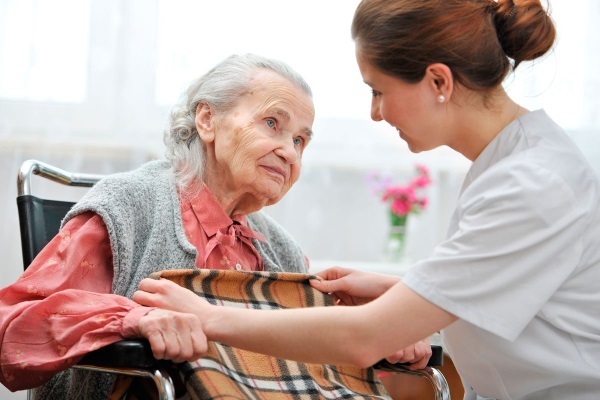
Patients need to create the most comfortable and safe living conditions:
- Organize living space so that any task can be done easily.
- It is necessary to install good lighting, highlight important items.
- It is important to communicate with the patient in short sentences without irritation and not to rush the person with an answer.
- It is recommended to encourage any activity of the patient.
- It is important to remember about the daily routine, the rules of personal hygiene and timely give medications to the patient.
Close relatives, together with the patient, receive great responsibility, since they must monitor the person's condition. Careful patient care will allow timely identification of mental changes and somatic disorders.
Dementia in women often appears after age 50. The first symptoms and signs depend on the degree of damage to the central nervous system and the brain. It is important for people who are at risk to remember about preventive measures that will help reduce the likelihood of developing the disease. In the case of a hereditary predisposition, it is necessary for preventive purposes to visit a neurologist in order to timely identify pathological processes.
Dementia Videos
Dementia It is impossible to prevent, it is impossible to inactive:

